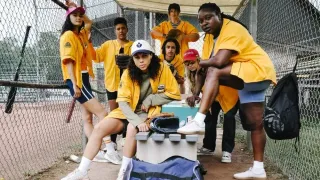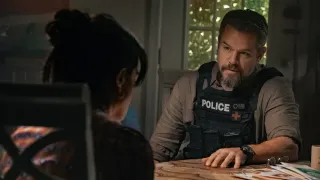April 26, 2022
'Firebird's flight: Peeter Rebane and Tom Prior's Russian Cold War love story
Brian Bromberger READ TIME: 9 MIN.
When "Firebird" screened at last year's Frameline Festival in the just re-opened Castro Theatre, it received a deserved standing ovation from the nearly full house. It won an Honorable Mention in the Juried Award for First Feature at the Festival. The dreamy romance of the two handsome leads is the best gay male love story since "God's Own Country" (2017).
Based on the true memoir by Sergey Fetisov (1942-2017) set during the Cold War, Sergey (Tom Prior), is a young private, weeks away from completing his Soviet Air Force conscription in Estonia in 1977. He dreams of becoming an actor in Moscow. He works with Luisa (Diana Pozharskaya) an ambitious secretary to the base commander. She is secretly in love with Sergey, but when an ace fighter pilot Roman (Oleg Zagorodnii) arrives at the base, both Sergey and Luisa are attracted to him.
Sergey and Roman begin a forbidden but passionate affair, especially precarious during this tense period, as they must hide their affections from everyone or face dire consequences. Confronted with an anonymous KGB report that Roman has been engaging in immoral behavior, to save his career, Roman denies everything and ends his relationship with Sergey. Sergey leaves broken-hearted.
A year later, Sergey in Moscow pursuing acting, sees Luisa, who informs him she is marrying Roman. He dutifully attends the wedding. Meeting a few months later, Roman announces Luisa is pregnant. Once again, they go their separate ways.
Years later on a training course in Moscow, Roman will look up Sergey and they reignite their secret relationship. Risking everything, can their love persevere and they remain together?
Roadside Attractions has picked up the film for U.S. distribution. In preparation for its April 29 release in theaters, the Bay Area Reporter spoke to British star/writer/co-producer Tom Prior ("The Theory of Everything; Kingsman: The Secret Service") and Estonian writer/director Peeter Rebane, via a Zoom video interview in London, where their film premiered.
The first question addressed the elephant in the room. At a time when Russia is attacking and committing war crimes against Ukraine and the world is canceling and boycotting Russian cultural events, should audiences watch this film?
Rebane replied, "We should not judge the people by their horrific leader. That would be as unjust as me saying, 'I don't want to have anything to do with the people of Florida due to their horrendous new legislation against 'homosexual propaganda.'
"I know many people who have escaped, including the founders of the Side by Side Gay and Lesbian Film Festival (held in St. Petersburg), who told me that right after the Ukraine War started, Russian authorities began arresting all the political activists opposing the war and then LGBTQ activists. Pretty much anyone against the system is now being persecuted and arrested."
Straight actor Oleg Zagorodnii, who plays Roman, is from the Ukraine and despite the war, is doing fine. He's in constant communication via WhatsApp with both Prior and Rebane.
Rebane continued, "It is important to remind people that 'Firebird' is the film the Russian government tried to ban last year, so in no way is it endorsing Putin. In fact, it's the opposite. It's a film Russians don't want the world and its own public to see. When we played at Side by Side, and were doing a live online Q & A it had to be terminated because Russian bots attacked the website and the festival servers were eventually taken down by the government. Funnily, we later used servers in Ukraine to show the film in Russia."
Rebane also added that when they tried to cast some Russian actors in supporting roles, everyone said no. They loved the story and wanted to do it, but they couldn't risk their careers in Russia. The film was silenced at the Moscow International Film Festival in 2021 where ticket sales were shut down and demonstrators stood in front of the cinema with placards demanding to "Stop Homosexual Propaganda."
After the initial screening, Russian press headlines read: "A Brit, an Estonian, and a Ukrainian shame the Moscow International Film Festival," and the team received dozens of death threats.
Prior added, "By watching 'Firebird,' it is a vote against that very oppressive system which is going against the Ukraine now. The film is a story of true love at all costs and staying together in the face of the very same oppressive system, now oppressing a whole country."
One could argue that canceling the film simply for being about Russia conveys the same kind of nationalist thinking that led to the Russian invasion of Ukraine originally.
Prior commented that Ukraine has made more progress in LGBTQ rights than Russia, even though it still has a long way to go towards full equality. He observed that "the film is a microcosm of what is happening in the war, with one country more open and accepting [i.e. Western values] being squashed by a bigger country that is more oppressive in its values. I dearly love Russian culture and the people, but both have become lost in the war."
An authentic life
Because throughout the film Sergey is struggling to lead an authentic life of being who he is, Prior was asked about his connection to the LGBTQ community, especially since Rebane is openly gay.
"I consider myself part of the LGBTQ community in the sense I don't want to define myself in any particular way," he said. "I've had all kinds of experiences with all kinds of people."
When queried if that included gay men, Prior answered, "That is a matter of interpretation. I believe in being authentic, but not identifying with any particular categorization. The most paramount thing about myself and acting is to be true to my self."
However vague Prior might be in sexually identifying himself, he had strong opinions on whether only gay actors should play gay roles.
"If we start saying only gay actors can play gay parts, then how do we know the pendulum might not swing the other way and then only straight actors can play straight parts, which I think would be terribly sad."
He continued, "For anyone on any kind of spectrum, it's really being able to inhabit the truth of your character, which is always my job as an actor. It comes down to the integrity of the actor. We should be cast on merit, not life circumstances. Where does the line stop? Do you have to be a real shark hunter to play one in a film? And how can you really know the actor is gay. If someone really wants the role, they could say, 'Sure I'm gay.' If you're only going to interview gay actors, that is discrimination."
Rebane noted that only trans actors should play trans roles because, he said, "There is a different physical quality to their performance and having had a very close trans friend, who recently passed away, a straight or gay actor could not do the part justice because the experience of going through that change and also the physical change itself, would be fake. We can't say gay actors should be hired for all roles, but straight actors cannot try out for gay roles. We need to say that gay actors should have equal opportunities for all roles and then the best person should get the role."
True story
Both Prior and Rebane met and interviewed the real-life Sergey before he died in 2017. Prior found him to be "an amazingly warm, generous, caring, and charismatic soul. He behaved in a way that was truthful and authentic but streetwise. Peeter and I went to dinner with him in Moscow, and he was openly flirting with the male waiter, which is daring, but not in any sleazy way, just being true to himself. He did the best he could with what he had, in an environment not conducive to his lifestyle."
Rebane appreciated that he could ask Sergey questions like what music did he listen to or his favorite food, which provided behind the scenes information not in the book and "maybe 95% of it is not directly on the screen, but it informed our choices on how to tell his story."
Rebane hasn't compared "Firebird" to other gay romance films, even though he knows people have called it "Brokeback Mountain" meets "Top Gun." He believes it's the unique setting, a Cold War story told from a Soviet military perspective, that sets it apart from other queer films, as does its emphasis on friendship, so the relationship between Sergey and Luisa is as important as the two men.
As for the themes of the film, Prior believes that it calls people to live more courageously and authentically, even if they aren't a part of the LGBTQ community. One should treat all people with openness and respect. Prior said the filmmakers made a conscious choice "to stress the love, two souls merging, rather than the explicit, mechanical sexual interactions."
Rebane commented that one of Sergey's last wishes before he died, "was to make the film about love, not politics; to show how love has been repressed and how authoritarian systems' oppression of love creates suffering and pain for everyone involved, not just the two lovers. It's very easy to say Luisa is at fault and is an obstacle, but it is important to look at it from different perspectives and for me her tragedy is equally sad. She doesn't choose such a love and she couldn't know or do anything about it."
For Rebane, it was the simple, human story that touched him and pushed him to make the film.
"It's so sad to think how the system destroyed their lives, which is exactly what is happening in Ukraine," he said. "45 years later, it's the same system, same KGB and dictatorship, with nothing really having changed. I grew up as a heavily repressed young teenager with our summer house in Estonia just a few miles from a Soviet military base, but I could never have imagined such a love story happening there.
"Yet when we started interviewing people, now in their late 60s, early 70s, who served in the Soviet military in the 1970s and who had same-sex relationships, we discovered a whole subculture that I knew nothing about and then realized life went on during the Cold War and people fell in love."
Rebane continued, "Initially when I was writing the film, because of my own memories of having to hide my feelings and true self, I was going to make Sergey more repressed, but fortunately Tom came along reminding me that despite all Sergey's suffering, pain, and losses, he still remained compassionate, positive, and full of life. He didn't become bitter or regretful."
The director mentioned his earlier work for comparison.
"Prior to 'Firebird,' I had made documentaries where my mantra was always to stay out of the frame, not to comment on anything, no voice overs, no narration, just 100% observational. I could have made a documentary on this material, but that approach wouldn't have worked here. I knew that we would touch a lot more people's hearts through a narrative film. I've seen many people with pretty strong emotions at the end of the screening, which has been very rewarding.
"We made the right choices on how to produce this film. I didn't set out to make a political film. I wanted to tell the story of three people, living their lives in an authoritarian, hostile society, trying to find love despite having the odds stacked against them. Now is the time to foster more respect for one universal human right: to love and be loved."
'Firebird' opens in U.S. theaters April 29. www.firebirdmovie.com
Help keep the Bay Area Reporter going in these tough times. To support local, independent, LGBTQ journalism, consider becoming a BAR member.






